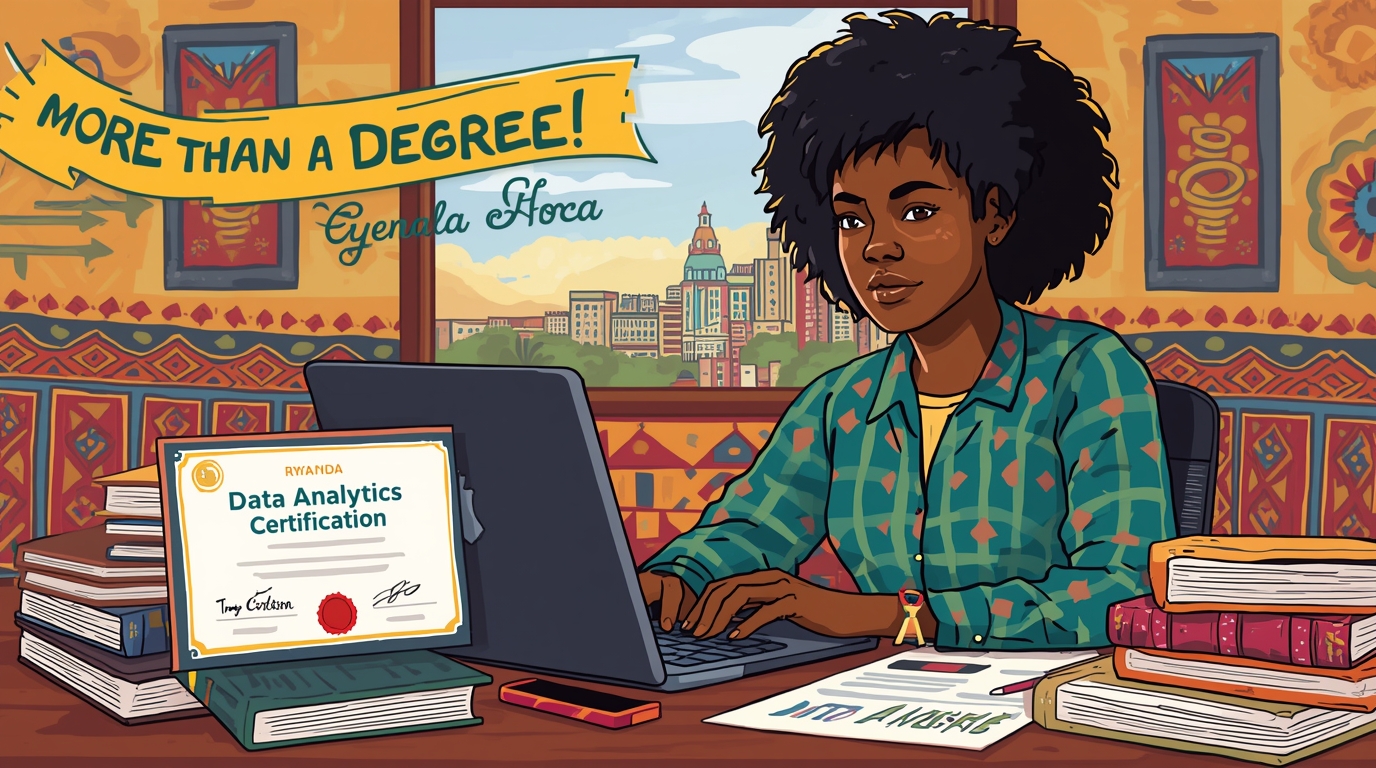I remember standing on the terrace of a building in Kacyiru a few months ago, looking out over Kigali as the sun went down. The city lights were just starting to twinkle on the hills. It’s a view that always gets me. It doesn’t just look beautiful; it looks like ambition.
You can feel it here, can’t you? From the buzzing start-up hubs in Norrsken House to the relentless pace of construction across the city. Rwanda isn’t just developing; it’s sprinting. We don’t want to just catch up with the rest of the world; we want to leapfrog it.
But there’s a conversation I keep having with bright, ambitious young people here, and it always ends the same way. They have the degree. They went to university, they wore the gown, they made their parents proud. But now they’re stuck in a job that doesn’t stretch them, or worse, they’re struggling to find one at all.
They did everything “right,” but the old keys don’t seem to fit the new locks that Rwanda is building.
In a country that is betting its entire future on becoming a knowledge economy, a standard degree is no longer enough. We need a new set of tools. And right now, the most powerful tool in that box is Data Analytics.
It’s more than just another qualification. For Rwanda right now, it’s a golden ticket.
The Engine Room of Vision 2050
We all know about Vision 2050. We know the goal: high-income status, a hub for innovation, the “Singapore of Africa.” It’s a magnificent dream. But dreams don’t build themselves.
Vision 2050 isn’t just going to be built by politicians or foreign investors. It’s going to be built by us. And it’s going to be built on data.
Think about what Rwanda is trying to achieve. We are trying to optimise agriculture on limited land. We are trying to deliver world-class healthcare to remote villages via drones. We are trying to build smart cities that run efficiently.
None of these things can happen on guesswork. They happen on hard evidence.
- How do we know exactly which hillsides need more fertiliser this season? Data.
- How do we predict exactly where the next malaria outbreak might occur so we can get medicines there first? Data.
- How does a Rwandan FinTech startup know exactly what new service the unbanked population actually needs? Data.
Right now, Rwanda is generating mountains of this information, but we don’t have enough people who know how to read it. We have a surplus of generalists and a desperate shortage of specialists.
From “I Think” to “I Know”
This is where the real power of Data Analytics lies for your career. It changes the way you work.
In too many Rwandan offices, decisions are still made based on who is the most senior person in the room. The boss has a “hunch,” so that’s what we do.
Data democratises that room. When you are the person who understands the data, you don’t just have an opinion; you have proof. You can walk into a meeting with your manager and say, “I don’t just think we should launch this new product in Musanze first; I know we should, and here are the numbers that prove why it will work.”
That is an incredibly powerful position to be in. It instantly fast-tracks you from being just another junior employee to being a key strategic advisor. You become indispensable.
Busting the “Maths Genius” Myth
I know what you might be thinking, because it’s the same fear that holds so many people back. “But I was terrible at maths in secondary school. I’m not a ‘numbers person’.”
Let me tell you a secret: Modern data analytics is less about complex calculus and more about curiosity.
Are you the kind of person who asks “why?” When you see something happening—like a sudden trend on social media in Kigali, or a new business popping up everywhere—do you wonder what’s driving it?
If you have that curiosity, you have the raw material to be a data analyst. The tools we use today (software like Tableau or Python) handle the heavy mathematical lifting. Your job isn’t to be a human calculator; your job is to be a detective. Your job is to look at the information and find the story hidden inside it.
Don’t let a fear of old-school maths stop you from a future-proof career.
Where Are the Jobs in Rwanda?
You might be wondering if this is just hype. Are there actually jobs for this here, on the ground, today? Absolutely. And they aren’t just in “tech companies.”
- NGOs and Development: Rwanda is a hub for international NGOs. They all need to prove their impact to donors. They are desperate for people who can take their field data and turn it into clear reports that show their success.
- Finance & FinTech: innovation is exploding here. Banks and mobile money lenders need data analysts to assess credit risk for people who don’t have traditional collateral.
- Agriculture: It’s still the backbone of our economy. New AgriTech firms need data analysts to help improve yields and connect smallholder farmers to markets efficiently.
- Government & Policy: As Rwanda digitises its services (Irembo is just the start), the government needs people who can use that data to make public services better and faster.
The Investment in Yourself (vs. The Cost of Waiting)
Finally, let’s talk about the elephant in the room: money and time. Pursuing a Master’s degree, especially an M.Sc. in something technical, is a serious investment. It costs money, and it takes time that you might feel you don’t have because you’re already working 8-to-5 (or later).
But we need to change how we view this. In Rwanda’s hyper-competitive, fast-moving market, standing still is the most expensive thing you can do.
If you stay with just your basic degree, where will you be in five years? Likely fighting for the same mid-level generalist jobs with thousands of new graduates who are younger and cheaper to hire than you.
Investing in a high-demand, specialist skill set like Data Analytics is how you future-proof yourself.
And the good news is that education has changed. You no longer need to quit your job and move abroad to get a world-class education. Modern, online M.Sc. programmes are designed exactly for people like us—people who have ambition and hustle, but who also have rent to pay and families to support. They let you study late at night after work, or on weekends. They let you apply what you learn on Tuesday directly to your job on Wednesday.
Your Seat at the Table
Rwanda is building something special. You can see it every day. The question is, are you just going to watch it be built, or are you going to be one of the architects?
Data is the new language of that architecture. Learning to speak it might just be the best career decision you ever make.
Frequently Asked Questions
Are there actually data jobs in Rwanda right now, outside of tech companies?
The demand for data skills in Rwanda goes far beyond just “tech.” International NGOs need analysts to prove their impact to donors. Banks and FinTechs need them for credit scoring. The government needs them to improve digital services like Irembo. Agriculture needs them to increase crop yields. It’s a skill set in high demand across almost every major sector in the country.
I’m not good at maths. Can I really become a data analyst?
Yes. Modern data analytics is less about complex manual calculations and more about curiosity and problem-solving. Tools like Tableau and Python handle the heavy mathematical lifting. If you are a logical thinker who enjoys asking “why” and finding patterns, you have the core skills needed to succeed.
How can I study for an M.Sc. while working full-time in Kigali?
Modern M.Sc. programmes are designed specifically for working professionals. They are often fully online and flexible, allowing you to study late at night, early in the morning, or on weekends. This means you don’t have to quit your job or lose your income to upgrade your qualifications; you can fit your studies around your existing life and responsibilities.




